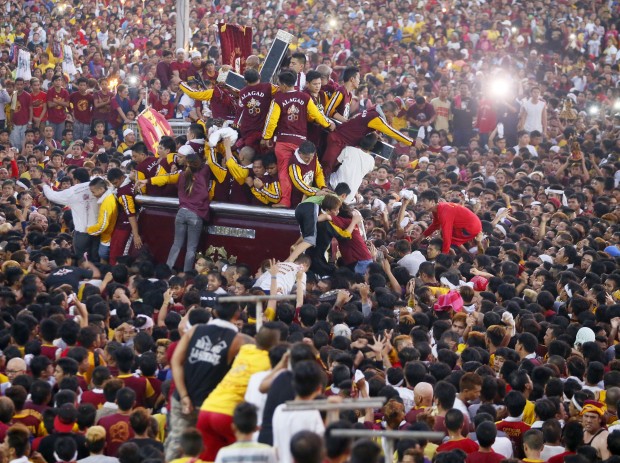No cellphone signal during Black Nazarene rites; drones banned

The government will turn off cellular phone signals during the Traslacion or procession of the Black Nazarene in Manila on Jan. 9, 2017, as a security measure. Drones will also be banned from being flown along the procession route and venues. AP FILE
Cellular phone signals will be jammed all throughout the duration of the Black Nazarene procession on Monday, the Armed Forces said Wednesday.
Lieutenant Col. Llewellyn Binasoy made the announcement in a press briefing at Quiapo Church as he appealed to devotees and the public for understanding and cooperation.
Binasoy said signal jamming was part of the security measures for the annual religious feast, which is expected to draw at least 15 million devotees this year.
“For the areas or the route of the procession, there will be no signal. We hope you understand that’s part of our security preparations,” he said.
Binasoy said flying drones during the procession would also be prohibited, noting that the area was a no-fly zone subject to regulations.
The officer said the security arrangements would in place despite the lack of any credible threat to the Traslacion, the yearly procession which commemorates the transfer of the image of the suffering Christ to the Quiapo church from its original site in what is now the Luneta.
On Nov. 28, 2016, an improvised explosive device (IED) was found in a trash can near the US Embassy in Manila. Three suspects were arrested after the bomb failed to detonate and police traced the IED to the would-be bombers through a cellphone that was supposed to trigger the explosive.
Binasoy said suspects in failed bombing were already under police custody.
Philippine National Police chief Ronald dela Rosa said the suspects were part of a terror cell of the Islamist Ansar Al-Khilafa Philippines and the Maute Group based in Lanao del Sur.
Dr. Virgilio Martin of the Manila Health Department said no garbage cans would be placed in the vicinity of the Quirino Grandstand, where the procession will start, to prevent bomb scares. CBB